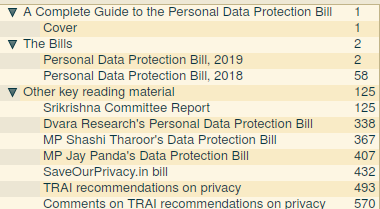pystitcher stitches your PDF files together, generating nice customizable bookmarks for you using a declarative input in the form of a markdown file. It is written in pure python and uses PyPDF3 for reading and writing PDF files.
I do a lot of ebook generation projects, and stitching together PDFs is always a pain, especially if you care about bookmarks and metadata.
pystitcher lets you convert:
existing_bookmarks: remove
title: Complete Guide to the Personal Data Protection Bill
author: Medianama
keywords: privacy, surveillance, personal data protection
subject: Personal Data Protection Bill
# A Complete Guide to the Personal Data Protection Bill
- [Cover](cover.pdf)
# The Bills
- [Personal Data Protection Bill, 2019](https://example.com/2019-bill.pdf)
- [Personal Data Protection Bill, 2018](https://example.com/2018-bill.pdf)
# Other key reading material
- [Srikrishna Committee Report](2.a.pdf)
- [Dvara Research's Personal Data Protection Bill](2.b.pdf)
- [MP Shashi Tharoor's Data Protection Bill](2.c.pdf)
- [MP Jay Panda's Data Protection Bill](2.d.pdf)
- [SaveOurPrivacy.in bill](2.e.pdf)
- [TRAI recommendations on privacy](2.f1.pdf)
- [Comments on TRAI recommendations on privacy](2.f2.pdf)
to a proper PDF, exactly as you’d expect:

It’s intentionally declarative, so you can easily keep changing your source input file and re-generate the PDF multiple times very easily. It also support lots of filters to let you pick specific pages, or rotate/zoom pages that get stitched.
The wiki has a set of Guiding Principles the tool tries to follow, and we’ve a bunch of open issues that you can get started at.